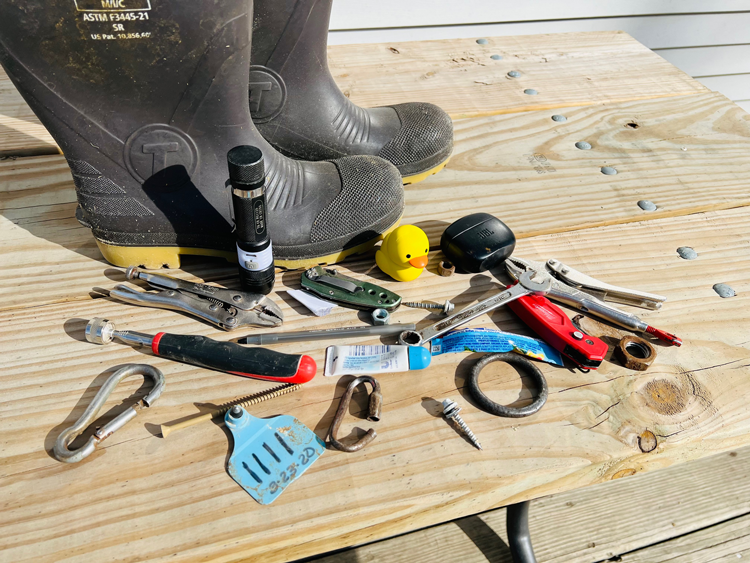
Every few days when I throw a load of our farm clothes in the washing machine, I take extra special care to empty the pocket contents. To be honest, this hasn‘t always been my strong suit. I’ve had everything from screws and small vice grips to bands for castrating and ear tag backs make their way into my washer over the years (and I’m only 29!).
Each farmer seems to have their own list and standards of what they consider to be their daily pocket essentials. At the start of every day — before we don our hats and shove our sore feet into those chore boots — we must first load up our pockets with all our little treasures that are sure to come in handy as we make our way through cattle chores, field work, machinery fixes, and beyond.
When nighttime comes and our jeans and/or coat pockets have done their duty, everything we’ve carried or collected from the day gets emptied out onto the table, counter, truck console, or another random prime piece of real estate to be reloaded into our pockets the next day so we can do it all over again. Depending on my mood, I either chuckle or roll my eyes at the collection of “pocket essentials” my husband and I set on the bathroom counter when each day comes to a close.
Between my brother, mom, dad, husband, and I working on our dairy operation, the contents of each pocket vary widely and is known by others. My dad is all about practicality and simplicity, carrying his knife and small vice grip at all times. I’m sure to have my earbuds, ChapStick, and a tissue handy (among other practical items) to keep my sanity. Not to mention the endless baby items I keep stashed when I’m carrying our 6-month-old daughter with me. Other personal items we all carry often include mints, pliers, paper lists, pens, and the list goes on. While those are all things we start the day with, we also collect countless odds and ends as we go about our chores during the day.
It may be a veterinary supply like extra syringe needles, a stray cattle pill, cow magnets, bands for castrating bull calves, or nasal inoculation syringe tips for vaccinating newborn calves. Or maybe it involves preparing machinery for fieldwork, including nuts, bolts, greasy shop towels, fittings, and stray fuses. It could also come from working with the animals, where you might need paper towels for wiping teats, lists of fetch cows for the robotic milkers, twine for a quick fix, ration printouts, tail chalk for marking animals, chain clips, a stray ear tag you found in the manure, or extra tag backs.
Whatever accumulates in your pockets throughout the day tells a bit of a story of what the day entailed. Some of those stories include blood, sweat, and lots of manure, while others may involve laughter, smiles, or even tender moments. At the end of the day, be grateful for each moment. Oh, and don’t forget to empty those pockets before you start the washer!

The author dairy farms with her parents and brother near Hawkeye, Iowa. The family milks approximately 300 head of grade Holstein cows at Windsor Valley Dairy LLC — split half and half between a double-eight parallel milking parlor and four robotic milking units. In the spring of 2020, Molly decided to take a leap and fully embrace her love for the industry by returning full time to her family’s dairy.





